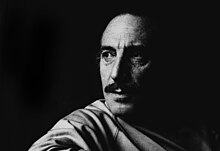Orlando Letelier
| Orlando Letelier | |
|---|---|

Letelier in 1976
|
|
| Born |
Sergio Orlando Letelier del Solar April 13, 1932 Temuco, Chile |
| Died | September 21, 1976 (aged 44) Sheridan Circle, Washington, DC |
| Cause of death | Car bomb |
| Nationality | Chilean |
| Known for | Letelier case |
| Spouse(s) | Isabel Margarita Morel |
| Children | Cristián, José, Francisco, Juan Pablo |
| Parent(s) | Orlando Letelier Ruiz Inés del Solar |
Marcos Orlando Letelier del Solar (April 13, 1932 – September 21, 1976) was a Chilean economist, Socialist politician and diplomat during the presidency of Salvador Allende. As a refugee from the military dictatorship of General Augusto Pinochet, Letelier accepted several academic positions in Washington, D.C. He was assassinated by agents of DINA, the Pinochet regime's secret police, in 1976, in collaboration with members of the Coordination of United Revolutionary Organizations.
Letelier was born in Temuco, Chile, the youngest child of Orlando Letelier Ruiz and Inés del Solar. He studied at the Instituto Nacional and, at the age of sixteen, he was accepted as a cadet of the Chilean Military Academy, where he completed his secondary studies. Later he abandoned the military life. He never finished college and never received a university degree. In 1955, he joined the recently formed Copper Office (Departamento del Cobre, now CODELCO), where he worked until 1959 as a research analyst in the copper industry. In that year, Orlando Letelier was fired for supporting Salvador Allende's unsuccessful second presidential campaign. The Letelier family had to leave for Venezuela, where he became a copper consultant for the Finance Ministry.
Letelier married Isabel Margarita Morel Gumucio on December 17, 1955, with whom he had four children: Cristián, José, Francisco, and Juan Pablo.
Letelier's first political participations were as a university student, when he became a student representative at the University of Chile's Student Union. In 1959 Letelier joined the Chilean Socialist Party (PS). In 1971 President Allende appointed him ambassador to the United States because he had some unique leadership qualities rare among Latin American socialists of the time: chiefly among them a sophisticated grasp of the complexities of US politics and an in-depth knowledge of the copper industry. His specific mission was to try to defend the Chilean nationalization of copper against the previous private ownership favored by the US government.
...
Wikipedia
